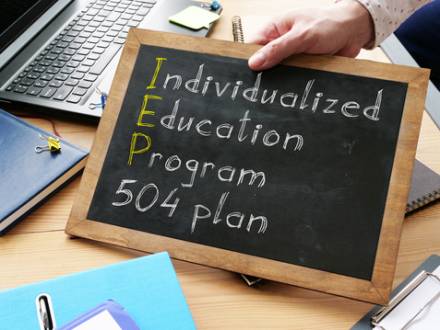LET US BE YOUR FAMILY'S ADVOCATE
Divorcing with a Child Who Has an IEP or a 504 in Texas
 When a child has unique educational needs under an Individualized Education Program (IEP) or a Section 504 plan, divorce presents unusual challenges. In Texas, decisions about custody, visitation, and decision-making authority must consider the child’s educational requirements as well as their emotional and physical well-being. Parents need to ensure that their child’s rights under federal and state education laws remain fully protected during and after the divorce process.
When a child has unique educational needs under an Individualized Education Program (IEP) or a Section 504 plan, divorce presents unusual challenges. In Texas, decisions about custody, visitation, and decision-making authority must consider the child’s educational requirements as well as their emotional and physical well-being. Parents need to ensure that their child’s rights under federal and state education laws remain fully protected during and after the divorce process.
Sharon Ramage, lead attorney at The Ramage Law Group, brings rare insight to these matters. As a specialized Collin County, TX family law attorney, Ms. Ramage spent more than a decade as a special education hearing officer and mediator with the Texas Education Agency, and she has lectured extensively on special education law for national, state, and local professional associations. That background allows her to approach child custody and divorce cases involving IEPs and 504 plans with an understanding that goes far beyond standard family law experience.
How IEPs and 504 Plans Affect Custody in Texas
An IEP is a legally binding plan under the Individuals with Disabilities Education Act (IDEA) that outlines the special education services a school must provide to a child. A Section 504 plan, based on the Rehabilitation Act of 1973, ensures accommodations for students with disabilities so they can participate fully in general education settings.
In a Texas divorce, the terms of custody (known as conservatorship) can directly affect how educational decisions are made. Parents may share joint managing conservatorship, or one parent may be named the sole managing conservator. When a child has an IEP or 504 plan, the custody arrangement should clearly state:
-
Who will make educational decisions, including approving changes to the IEP or 504 plan
-
How both parents will communicate with the school and each other about the child’s progress and needs
-
How disputes about the child’s education will be resolved
Without clear agreements, misunderstandings or conflicts can delay services, create unnecessary stress for the child, or lead to disputes with the school district.
Addressing Special Education Needs in a Parenting Plan
Parenting plans in cases involving children with disabilities must be specific and comprehensive. They should address school choice, transportation to specialized programs, and participation in therapies or support services outside of school hours. When parents live far apart, the plan must ensure that the child’s schedule and services remain consistent.
Ms. Ramage’s experience with the Texas Education Agency provides an informed perspective on how to draft enforceable agreements that also comply with the procedural safeguards built into IDEA and Section 504. She understands how school districts operate, what documentation they require, and how to ensure that a child’s educational rights remain intact regardless of changes in the parents’ relationship.
What Happens When Custody Disputes Involve Education Law?
Parents of children with disabilities often juggle medical, therapeutic, and educational schedules. A divorce can disrupt that delicate balance if it is not approached with foresight.
In some cases, custody disputes intersect directly with special education law. For example, one parent may disagree with the services proposed in an IEP, or a school may raise concerns about inconsistent parental support. These situations require a lawyer who can navigate both family law and the administrative processes of education law.
An attorney with both family law and special education experience can:
-
Negotiate custody terms that reflect the child’s individual needs
-
Ensure that court orders align with IEP or 504 requirements
-
Advocate for the child’s continued access to all necessary services
-
Address future modifications as the child’s needs evolve
With these safeguards in place, parents can focus on helping their child thrive rather than fighting over logistics and access to services.
Contact a McKinney, TX Child Custody Lawyer
If you are divorcing and your child has an IEP or 504 plan, we can help protect your child’s educational rights and ensure your parenting plan reflects their needs. Contact our Collin County, TX divorce attorneys at The Ramage Law Group by calling 972-562-9890 to work with counsel who understands both Texas family law and the complexities of special education.
Finding The Right Attorney Matters. Contact Us Today.
A family lawyer does much more than simply provide legal answers. Our lawyers explore a variety of different solutions to help you achieve your goals and secure your family's financial and emotional future and stability.
To discuss your case or set up a consultation, call us at 972-562-9890 or use the online contact form.



















